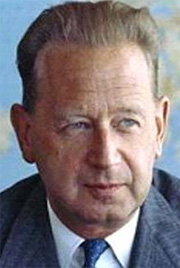My search for reflections on the life and work of Dag Hammarskjold emanating from Caribbean thinkers and institutions concerned with International Relations may well have been less than vigorous, though, even if it was, I doubt that a great deal was written in the region about the man who is still thought of by many as the best Secretary General the United Nations ever had.
If ever you were a student of International Relations you would have had reason to study the role which the UN has played in global affairs, and in the process the role that Hammarskjold played would have come to your attention.
And if you were a student of the era of decolonization in Africa and elsewhere you would have remembered Hammarskjold’s efforts to broker the least painful transitions. Indeed, it was this pursuit that took him to his death on September 1961 in a plane crash at a place called Ndola in what is now Zambia. How or why the plane crashed is yet to be decided upon half a century after his death. It has been suggested that the CIA might have had a hand in his demise but there were other forces whose interests did not coincide with Hammarskjold’s diplomatic preoccupations.

I have read somewhere that Hammarskjold’s tenure as Secretary General was a source of discomfort to both the Americans and the British and that the reason had to do with the fact that his decolonization agenda did not sit well with the Cold War pursuits of the day. Another reason why the Americans and the British may have been uncomfortable with Hammarskjold is perhaps that he might have been expected to pander to the post-war powers-that-be which he did not. The prevailing logic of the Americans and the British might have been that even if he was the UN Secretary General the UN was, by and large, their invention and he was no more than an exalted civil servant. That he might have been but Hammarskjold wanted more for the UN.
We can choose, in remembering Hamarskjold, to reflect on his ground-breaking peace-keeping rules that kept the 1956 Suez Crisis in check, or better still we may choose to examine his more macrocosmic contribution to international relations, most if not all of which remains relevant today. When, for the last time on September 8, 1961, Hammarskjold addressed the staff of the UN Secretariat, he was seeking, even that many years ago, to unravel the conundrum of the real role that the UN should play. “What is at stake,” he said, “is a basic question of principle. Is the (UN) Secretariat to develop as an international secretariat with the full independence contemplated in Article 100 of the Charter or is it to be looked as an inter-governmental – not international – secretariat providing merely the necessary administrative services for a conference machinery? That is the basic question and the answer to it affects not only the work of the Secretariat but the whole of the future of international relations.”
Five years earlier, in 1956 he had told the Indian Council of World Affairs that “our world of today is one world………” and that “the weaknesses of one is the weakness of all, and the strength of one – not the military strength, but the real strength – the economic and social strength, the happiness of people – is indirectly the strength of all,” that mind you, at the height of the Cold War when the “one world” concept was almost certainly furthest from the minds of the great powers.
As for Hammarskjold’s most memorable diplomatic accomplishments during his tenure as UN Secretary, there are some noteworthy ones to choose from; like his efforts to improve the climate between Israel and the Arab states at the height of the Middle East Crisis; his creation of the UN Emergency Force in 1956 when the Cold War, the conflict in the Middle East and the independence pursuits in Africa, created numerous flashpoints.
On the other hand there are those who might favour Hammarskjold the visionary, the man whose perspective more than half a century ago on the role of the United Nations, still remains part of critical global discourses on International Relations.
Arnon Adams




